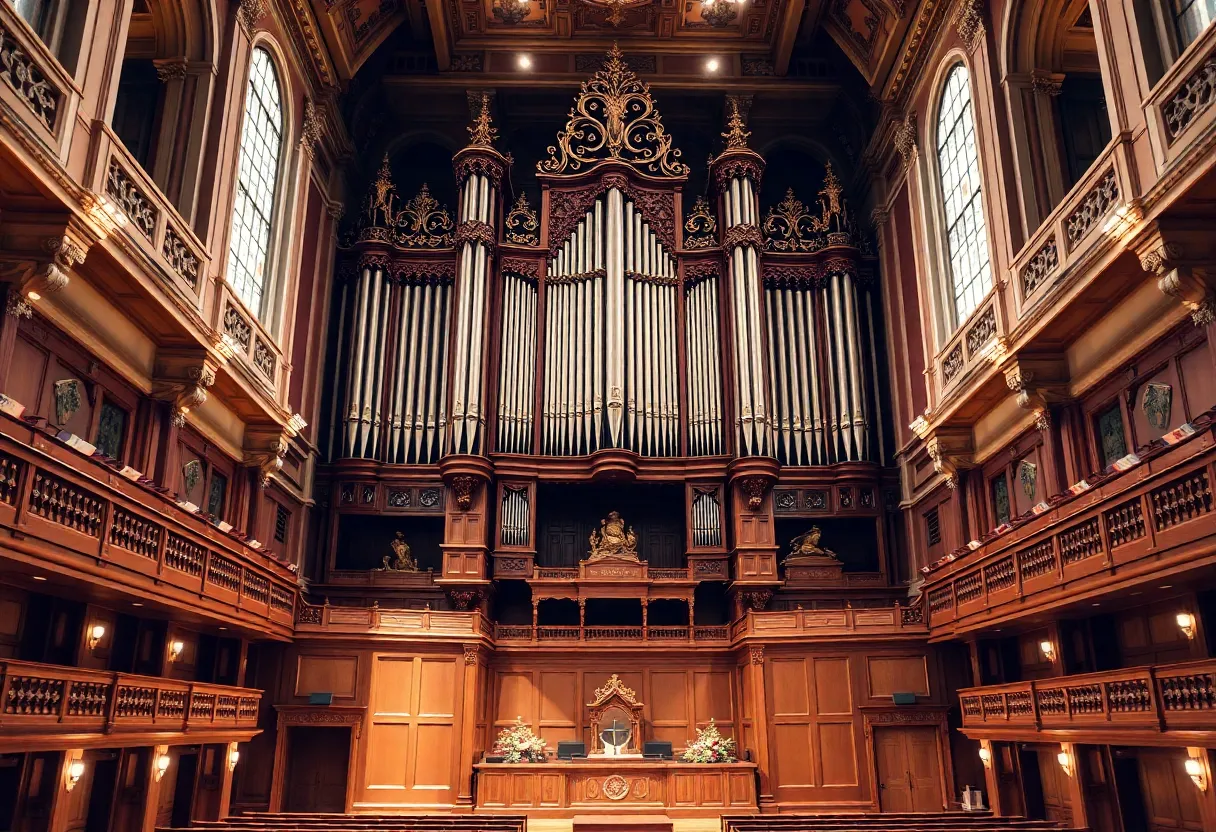Methuen, Massachusetts, October 9, 2025
News Summary
The Methuen Memorial Music Hall in Massachusetts is a remarkable venue, purpose-built to house ‘The Great Organ’—the first concert organ in the US. Originally constructed by E.F. Walcker and Company in Germany during the Civil War, this historic organ remains a central attraction for visitors and students. Following its relocation to Methuen by millionaire Edward Frances Searles, the hall now serves as a cultural center, hosting numerous events and providing music education to local students.
Methuen, Massachusetts — The Methuen Memorial Music Hall, located in Methuen, Massachusetts, is often mistaken for an old city building but was specifically built to house “The Great Organ,” the first concert organ in the United States. The organ, constructed in Germany during the Civil War era for a Boston concert hall, remains the hall’s defining feature and continues to draw visitors, students, and musicians to Methuen.
What is most important
The organ was constructed by E.F. Walcker and Company in Ludwigsburg, Germany, during the Civil War for the Boston Music Hall, which is now the Orpheum Theater. The Great Organ was state of the art in 1863, consisting of over 6,000 pipes and 85 stops that create its distinct sounds through a large bellows system. After 21 years, The Great Organ was removed from the Boston Music Hall to make room for the Boston Symphony Orchestra and was put into storage for several years. Methuen millionaire Edward Frances Searles, also an organist, purchased The Great Organ in 1897 and had the music hall constructed specifically to house it.
Supporting details
The organ case is intricately carved from wood sourced from the Black Forest and is recognized worldwide. The hall’s design and engineering were completed to match the instrument: Searles designed the concert hall in 1909, ensuring it matched the grandeur of the organ and included architects and engineers who optimized the hall’s acoustics, eliminating the need for microphones during concerts. The organ was rebuilt in 1947 by Aeolian-Skinner and has been maintained with modern technology to keep it operational while respecting its historical integrity.
Technical specifications and sound
The Great Organ’s scale and mechanics produced an overwhelming sound experience in the 19th century. The organ provided an overwhelming sound experience by allowing concertgoers to hear reeds, flutes, and violins, often for the first time, leading to the phrase “pulling out all the stops”. Organist Fred MacArthur notes the organ’s significance lies in its history, age, and unique sound. These features remain central to the hall’s programming and educational uses.
Current use and community role
The concert hall became a non-profit cultural center in 1946 and has hosted several events since World War II. The Methuen Memorial Music Hall regularly features concerts, including a highly anticipated Christmas concert each year, and it is available for events like weddings and memorial services. Searles’ intention included providing musical history education for local students, with all fourth-graders in Methuen receiving lessons at the hall each spring. The Great Organ inspired musical community connections and support for children, as mentioned by the hall’s executive director, Ashley Haseltine.
Background and broader connections
In the mid-1800s, wealthy Bostonians sought to replicate the impressive concert organs they experienced during their travels in Europe, prompting the original Boston installation. Searles previously owned an organ company that operated on the music hall’s parking lot, and a copy of The Great Organ is located in the National Cathedral in Washington, D.C. These links illustrate both the local and broader cultural impact of the instrument and its design.
Summary
In sum, the Methuen Memorial Music Hall remains a purpose-built home for a nationally significant instrument. The Great Organ’s construction, relocation, continued maintenance, and role in education and performance form a continuous thread from mid-19th-century Boston to present-day Methuen.
FAQ
Where is the Methuen Memorial Music Hall located?
The Methuen Memorial Music Hall, located in Methuen, Massachusetts, is often mistaken for an old city building but was specifically built to house “The Great Organ,” the first concert organ in the United States.
Who built The Great Organ and for what original location?
The organ was constructed by E.F. Walcker and Company in Ludwigsburg, Germany, during the Civil War for the Boston Music Hall, which is now the Orpheum Theater.
What are the organ’s principal technical features?
The Great Organ was state of the art in 1863, consisting of over 6,000 pipes and 85 stops that create its distinct sounds through a large bellows system.
How did the organ come to Methuen?
Methuen millionaire Edward Frances Searles, also an organist, purchased The Great Organ in 1897 and had the music hall constructed specifically to house it.
What changes and restorations has the organ undergone?
The organ was rebuilt in 1947 by Aeolian-Skinner and has been maintained with modern technology to keep it operational while respecting its historical integrity.
What is the hall’s role in education?
Searles’ intention included providing musical history education for local students, with all fourth-graders in Methuen receiving lessons at the hall each spring.
How does the hall handle acoustics and performance needs?
Searles designed the concert hall in 1909, ensuring it matched the grandeur of the organ and included architects and engineers who optimized the hall’s acoustics, eliminating the need for microphones during concerts.
Are there related instruments or copies elsewhere?
A copy of The Great Organ is located in the National Cathedral in Washington, D.C.
Quick reference
| Item | Detail |
|---|---|
| Location | Methuen, Massachusetts |
| Instrument | The Great Organ (first concert organ in the United States) |
| Original builder | E.F. Walcker and Company, Ludwigsburg, Germany |
| Original site | Boston Music Hall (now the Orpheum Theater) |
| Year built | During the Civil War; state of the art in 1863 |
| Specifications | Over 6,000 pipes; 85 stops; large bellows system |
| Purchase and relocation | Purchased by Edward Frances Searles in 1897; hall designed in 1909 |
| Restoration | Rebuilt in 1947 by Aeolian-Skinner; maintained with modern technology |
| Cultural role | Non-profit cultural center since 1946; concerts, education, events |
| Education | All fourth-graders in Methuen receiving lessons at the hall each spring |
| Related instrument | A copy of The Great Organ is located in the National Cathedral in Washington, D.C. |
Deeper Dive: News & Info About This Topic
HERE Resources
Back to the Future: The Musical Hits Boston
Additional Resources
- CBS News: Methuen Memorial Music Hall and The Great Organ
- Wikipedia: Methuen, Massachusetts
- Patch: First Concert Organ in the U.S.
- Google Search: Methuen Memorial Music Hall
- Boston Globe: Methuen’s Treasured Organ
- Encyclopedia Britannica: Concert Organ
- Eagle Tribune: Famous Organ Gets 21st Century Upgrades
- Google News: Great Organ Methuen
- Harvard Magazine: Methuen Memorial Music Hall
- Google Scholar: Methuen Memorial Music Hall

Author: STAFF HERE BOSTON WRITER
The BOSTON STAFF WRITER represents the experienced team at HEREBoston.com, your go-to source for actionable local news and information in Boston, Suffolk County, and beyond. Specializing in "news you can use," we cover essential topics like product reviews for personal and business needs, local business directories, politics, real estate trends, neighborhood insights, and state news affecting the area—with deep expertise drawn from years of dedicated reporting and strong community input, including local press releases and business updates. We deliver top reporting on high-value events such as Boston Marathon, Head of the Charles Regatta, and Boston Harborfest. Our coverage extends to key organizations like the Greater Boston Chamber of Commerce and Associated Industries of Massachusetts, plus leading businesses in finance, biotech, and insurance that power the local economy such as Fidelity Investments, Biogen, and Liberty Mutual Insurance. As part of the broader HERE network, we provide comprehensive, credible insights into Massachusetts's dynamic landscape.





